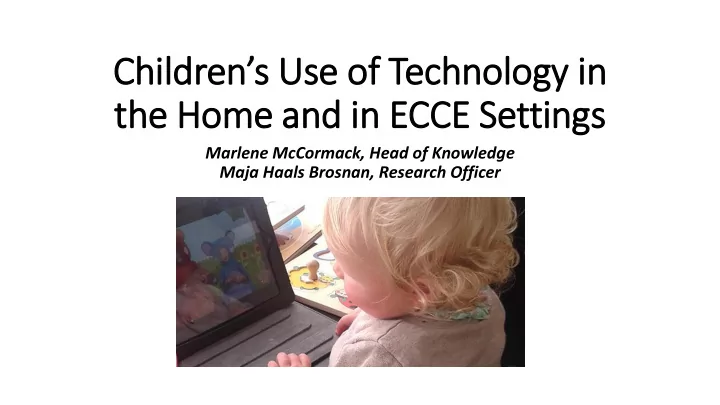

Children’s Use of Technology in the Home and in in ECCE Settings Marlene McCormack, Head of Knowledge Maja Haals Brosnan, Research Officer
Does ICT have a place in ECCE settings? Parents Educators
Participants Online Survey 248 Parents & 172 Educators Grandparents Fathers Carers 2% 8% 1% Mothers 89%
Context xt Children of all ages are increasingly exposed to and becoming adept at using a variety of different technology and media. According to an ongoing study on digital childhoods, 81% of Irish children are now online with “with notable trends towards individualised, privatised and mobile forms of access to the internet” . 82% of teenagers and 35% of 9-12 year olds also have a social networking profile. In addition, Irish children spend at least one hour per day online and 75% of 15-16 year olds use the internet everyday (EU Kids Online, 2011). Very little, however, is known about very young children’s use of and engagement with technology and media. Yet with the prevalence of older children’s use of technology it is important to understand how ICT and media influence younger children’s everyday lives, development and education.
Aim At Early Childhood Ireland we are interested in understanding the trends of children’s use of technology in early childhood care and education (ECCE) settings. In particular, we are interested in whether and how ECCE settings use ICT and media for educational purposes as well as for entertainment and communication purposes. With schools increasingly using ICT as part of their teaching but with research showing that Ireland is lacking behind its European neighbours in developing critical media literacy it is important to understand how ICT and media are used in different educational settings, including early childhood education, which increasing numbers of children are attending.
Does ICT have a place in ECCE? Educators Parents
Parents’ Thoughts on ICT for Young Children Priorities for Their Children
Parents’ Thoughts on ICT for Young Children ICT Uses in the Home 1. 1. 2. 2. 4. 5. 5. 3.
Parents’ Thoughts on ICT for Young Children Challenges and Worries
Parents on ICT Use in ECCE Settings Parents want Most parents The majority 80% of children to consider ITC of parents parents think Parents worry learn through skills identify the ICT should about too play , not ICT, necessary ages 3-4 as only be used much screen and want ICT for children the earliest for very time / to be used but not in age at which specific addiction to only as a early children activities in ICT learning tool, childhood benefit from ECCE not ICT settings ‘babysitting’
Educators’ Views on ICT for Young Children No place in Useful ECCE learning tool
Educators’ Views on ICT for Young Children • “Blocks and water play offer all the technology they require at age 3” • “Let them play…” • “ICT has no importance in preparing the child for school” • “Children can benefit from ICT but need exposure to non -ICT items first to help them develop their imagination • “ICT allows for sedentary behaviour” • “Limits creativity” • “The more technology the worse social skills” No place in ECCE • Children overexposed at home • Solitary • Replaces interaction • Inhibits development • Some fears that ICT worsening/causing ADHD and behavioural issues
Educators’ Views on ICT for Young Children • “It is the way forward so it should be allowed…” • “It is a world of technology so children should become familiar as early as possible” • “Need to acknowledge children’s interest and not create Useful forbidden fruit” • “Useful to bridge app gap” learning tool • Easier to monitor and use educationally in ECCE settings compared to at home • Should be used to complement curriculum, learning, particular themes and other work • Means to an end, not an end in itself • Should be set up in such a way that children collaborate on projects • Needs to be planned and have thought going into it
Current Use of ICT in ECCE Settings Do not provide 34.00% Provide or would like to provide ICT 66.00%
Current Use of ICT in ECCE Settings No place in ECCE Do not provide 34.00% Overexposure at home Provide or would like Lack of to provide ICT resources 66.00%
Current Use of ICT in ECCE Settings Do not provide 34.00% Provide or would like to provide ICT 66.00%
Current Use of ICT in ECCE Settings Do not provide 34.00% Provide or would like to provide ICT 66.00%
Educators’ ICT Confidence
ICT Learning Tool Examples Geography Cultural Awareness Music and Movement Citizenship Communication
For Educators • Laptops/PCs • Guidelines from DES (similar to • Tablets those for primary schools) • Digital cameras / video camera • Training • Interactive whiteboards • Additional funds / resources • Touch screen toys
Implications • Parents and educators think children are over- exposed to ICT and call for balance • The majority of parents’ worries primarily concern ICT behaviour associated with older children : • Online Safety • Cyber Bullying • Contents of video games • Screen time (easier to limit for young children) • Many of the parents’ concerns are easily addressed in ECCE settings: • ICT as learning tool NOT virtual babysitter • Monitor programme contents • Supervise use • Optimise use to enhance development • Planned and purposeful use • Ensure balance
Recommendations Children’s use of ICT needs to be supervised and controlled ICT in ECCE settings has to be integrated with / contribute to the curriculum ECCE settings need to collaborate with parents in use of ICT Educators need sufficient training and resource to optimise use of ICT ICT primarily appropriate in pre-school rooms, NOT in baby/wobbler rooms
Next Steps • ICT and children with additional needs • Case studies of ECCE settings with positive experiences of ICT use with children • Further research into how ICT can be optimised for ECCE settings • Design of training and resource portfolio
Recommend
More recommend